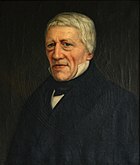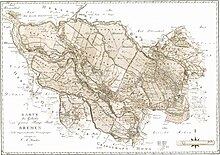French period in Bremen
The French period in Bremen is the period under French occupation from 1806 to 1814 in the general French period in German areas.
First sea blockades
In order to enforce the continental blockade , an economic blockade over the British Isles, France waged a war against Great Britain and against the Electorate of Hanover, which was united in the common ruling house, and occupied Kurhannover in the summer of 1803. France initially still observed the neutrality of Bremen . But the French blocked the Weser for sea trade to Great Britain. Bremen ships therefore called at Emden and then the Jade Bay and transported their goods overland. In 1804 Senator Johann Vollmers negotiated successfully with the French military governor in Hanover , General - later Marshal - Jean-Baptiste Bernadotte about easing the blockade. The sea blockade was lifted in October 1805. Bremen had to tolerate Prussian troops in the city from November 1805 to June 1806 . The British blocked the Weser.
French occupations from November 1806
In the Fourth Coalition War of 1806/07, Emperor Napoléon I won against Prussia. Bremen was occupied by French troops under Marshal Édouard Adolphe Mortier on November 20, 1806 . British goods were subject to reporting requirements, British and Swedish ships were arrested. With the re-established continental blockade, the occupiers banned trade with Great Britain and confiscated all British goods in the city. In March 1807, Bremen had to transfer 89,000 thalers to France to redeem British goods. British citizens were declared prisoners of war. The French governor Marschall Brune , who resided in Hamburg , was received in a splendid manner in Bremen on April 7, 1807, but the difficulties with France increased nonetheless. French troops were quartered in Bremen from November 1807 at the expense of the city; Bremen therefore took on new high debts, as trade was also considerably impaired. Bremen also had to bear the troop pay of 50,000 thalers a month and was also supposed to provide 500 seamen for the navy.
In 1807 around 30,000 citizens lived in Bremen-Stadt and in 1810 in the Bremen rural areas 12,461 inhabitants.
In January 1808, the French ambassador called Bourrienne the introduction of the Napoleonic Code as law book. A deputation from Bremen discussed this and delayed the undertaking. The tasks of the Bremen postal system had to be transferred to the Grand Duchy of Berg , led by Marshal Joachim Murat , in January 1808 .
In February 1808, instead of the French, Dutch troops were billeted. Riot or protest against French rule was threatened with death. When, on August 5, 1809, Duke Friedrich Wilhelm von Braunschweig traveled through Bremen with his black band fighting against France for only 24 hours, the city had to pay for this with high reparations to France. The Westphalian Division , connected with France, moved into Bremen under General Reubel, and high cash payments were the result.
Around 1809, Napoleon Bonaparte initially wanted to incorporate the Hanseatic cities into the Rhine Confederation of 1806. The Syndicus Heinrich Gröning negotiated it. On October 31, 1809, the Senators Johann Smidt and Johann Vollmers negotiated in Hamburg about proposals from France to form a state Villes Impériales Anséatiques with the French emperor's coat of arms and as a member of the Rhine Confederation, without foreign policy competence and, among other things, with the introduction of the Code Napoléon and the Code de Commerce of 1807 (French Commercial Code). The Syndici von Hamburger (Doormann) and Bremen (Gröning) and Lübeck's Senator Christian Adolph Overbeck negotiated in Paris in autumn 1809 and were reassured by Napoleon; the Hanseatic cities should only consistently enforce the continental block against Great Britain. However, with the discontinuation of trade with Great Britain, the Hanseatic city experienced major economic restrictions.
In February 1810 changing French regiments replaced the Westphalian Division . Bremen had to pay the troops. In September 1810, Bremen had 120 seamen for the French Navy. In December 1810, Senator Smidt traveled to Paris in order to obtain relief from the occupation costs and to obtain information about the upcoming annexation plans of the French. In mid to late December 1810, Smidt for Bremen and Dormann for Hamburg was announced that the three Hanseatic cities and northern Germany were to be incorporated into the French Empire from January 1811 .
The four Hanseatic departments were formed with the Département de l'Ems-Supérieur (Ober-Ems, headquarters in Osnabrück), the Département des Bouches de l'Elbe (Department of the Elbe estuary (s), headquarters in Hamburg) and the Département des Bouches du Weser (Department of the mouths of the Weser, headquarters in Bremen). Lübeck became the capital of an arrondissement in the Département des Bouches de l'Elbe. Bremen, Hamburg and Lübeck were called Bonne ville de l'Empire français .
Bremen in the department of the mouths of the Weser
The department of the mouths of the Weser or French department of the Bouches du Weser emerged as one of the three Hanseatic departments on January 1, 1811. The imperial city of Bremen, parts of the Duchy of Bremen, Duchy of Oldenburg and Delmenhorst, Duchy of Verden , parts of the Principality of Lüneburg and parts of the County of Hoya belonged to the department.
Napoleon was subordinate to the commander-in-chief of the army and the governor general of the north-west German departments. Philipp Karl Graf von Arberg , former chamberlain of Napoleon, was prefect of the Weser estuary department until October 17, 1813 ; The later Senator Johann Pavenstedt was sub-prefect .
In Hamburg , the high imperial court ( haute cour impériale ) was the highest court of the Hanseatic departments.
Bremen history in the department

Bremen was the capital of the department. The Bremen council was dissolved by an imperial décret on December 18, 1810. Bremen's municipal constitution was soon adapted to the French model. Bremen was divided into the three city cantons of West Bremen, East Bremen and Neustadt, and in the then Bremen rural area into the rural cantons of Arsten , Woltmershausen , Walle , Hastedt , Borgfeld and Oberneuland . Hemelingen belonged to the canton of Verden. The areas in and around what is now Bremerhaven were in the Bremerlehe district , which u. a. Today's Vegesack and Osterholz (with Blumenthal ) also belonged to the canton.
The Bremen upper class felt the French period as oppressive or, as it was later called, as a "period of suffering". They lost their privileges. The mayors Christian Abraham Heineken , Daniel Klugkist and Heinrich Lampe , Franz Tidemann , some senators like Smith, Iken and Dr. Simon Hermann nuns and senior officials lost their positions and pensions. As collaborators those were called who worked closely with the French. The middle and lower classes were relatively indifferent to this, and a few welcomed the French progress.
The provisional mayor was Klugkist, who resigned on July 1, 1811, as much was determined by the prefect. Dr. Wilhelm Ernst Wichelhausen , professor at the Illustre Gymnasium in Bremen , and nuns was his adjunct . The office of Maire (mayor) was very ungrateful; he was a representative of the ruling power and should also represent the oppressed citizens of the city.
The Munizipalrat (local council) consisted of 24 members. He was sworn in on August 20, 1811 by the Prefect. The new municipal coat of arms showed the Bremen key on a golden field and above it the three golden bees of Napoleon and the French eagle on a wall crown. Justice and administration were separated. In Bremen, as in the other Hanseatic cities, former senators were formed into a higher court for civil and criminal matters, which was controlled by a French commissioner.
In the trades that were guilds abolished. For trade no longer was Collegium Seniorum of parent people in Bremen responsible, but a chamber of commerce ( Chambre de Commerce ), the Commercial Court ( Tribunal de Commerce ) and the Mercantile Exchange ( Bourse de Commerce ). The Bremen Syndicus (now municipal councilor and prefectural councilor) Christian Hermann Schöne was responsible for organizing the changes.
Maritime trade to the North Sea was blocked, so that only trade via the Baltic Sea as well as via canals and overland routes remained possible. The smuggling , especially on the British island of Helgoland , had greater importance. The various French internal tariffs made the goods considerably more expensive. The tobacco trade came to a standstill. The sugar refineries had to switch to sugar beet instead of sugar cane . The Bremen economy was at its lowest point.
The old taxes were replaced by property, furniture, door, window, stamp and personal tax as well as municipal taxes and patent fees (trade tax). The imperial tobacco control room was extremely unpopular because of the high monopoly prices. Wichelhausen was able to prevent the removal of the Bremen Roland , as he was only a patron saint of the city as St. Roland .
The French secret police, high taxes and levies on the central government and the recruitment of soldiers, especially the conscription of 325 seamen for the navy, made the French era appear to be a time of oppression. For the 128th Line Regiment, the department had to provide two battalions of unmarried young citizens, 175 of them from the city of Bremen. The regiment suffered heavy losses in the Russian campaign of 1812/13.
The Liberation


The defeats in the Russian campaign of 1812/13 intensified the hostility to the French among the lower classes observed by the imperial interior ministry. After the first riots in Bremen on March 15, 1813, General Jean Francois Saint-Cyr declared Bremen to be under siege on March 20 . Generals Dominique Joseph Vandamme as supreme commander and Saint-Cyr and Joseph Morand commanded four divisions in the area around Bremen . There were 1,500 French soldiers in the city and 2,000 in the vicinity. Small fighting took place in Lehe in March 1813 .
With the battle near Lüneburg on April 2, 1813, the first major combat operations of the allied Prussians and Russians against a French corps began. With the battle at the Nettelnburg lock on 28./30. May 1813 in the Hamburg suburbs of Nettelnburg and Ochsenwerder , the successful fighting intensified.
On April 23, Marshal Louis-Nicolas Davout , Governor General of the Départements des Bouches de l'Elbe, came to Bremen and then moved into the city of Hamburg, which had been occupied by the Russian Major General Friedrich Karl von Tettenborn . Tettenborn then fought under General Ludwig von Wallmoden-Gimborn , commander of the Russian-German Legion , against Davout and against General Marc Nicolas Louis Pécheux . In the battle of the Göhrde on September 16, the numerically clearly superior Prussian, Russian and Hanoverian troops were able to triumph and gain a decisive strategic advantage in northern Germany.
On October 13, Tettenborn moved from Boitzenburg via Verden with 440 cavalry , 330 infantry and 800 Cossacks in front of the city walls, accepted the formal surrender of the French occupation on October 15, solemnly received the keys of the from Bremen officials Passed the city and entered Bremen with his cavalry the next day. On October 18, he had to retreat once again from General Lauberdière's troops entering Bremen. Napoleon had already lost the Battle of the Nations near Leipzig on October 16, and the French then left the city for good on October 25. The Department's Journal ceased publication in October and the Neue Bremer Zeitung came out.
On November 4, 1813, Tettenborn reached Bremen again. He worked with some Bremen residents and initiated the first pacification measures with the establishment of a provisional government commission consisting of seven senators. Tettenborn had no legal competence in this regard. Syndicus Dr. Christian Hermann Schöne and 26 members of the city council advised the new Senate. As early as November 6, 1813, the city council was reconstituted and reintroduced the old Bremen city law . The old tax law, the lap , applied again. The outdated feudal system in Bremen was reintroduced in December 1813 with the Meierrechte from before 1811. Wichelhausen had to resign from his position as Mayor, he was not accepted in the Senate and so he became postmaster of Bremen. Former "French friends" were criticized - sometimes violently.
A volunteer force was formed and Tettenborn appointed Major Max von Eelking and Major Christian August von Weddig to command a cavalry and a field battalion (infantry). "Captain" Heinrich Böse founded the volunteer Bremen Jäger Corps with 75 men, which went out to fight in February 1814, but was no longer involved in combat.
The Crown Prince of Sweden and former Marshal of France Bernadotte and the Duke of Oldenburg Peter Friedrich Ludwig visited the liberated Bremen at the end of 1813. Over 1000 refugees were taken in from Hamburg, which was still occupied.
On April 10, 1814, all bells rang in Bremen to celebrate the victory and occupation of Paris .
Bremen becomes a sovereign state

As early as November 11, 1813, the Senators Smidt and Dr. Post with the secretary Dr. Johann Carl Friedrich Gildemeister went to Bernadotte in Hanover to consolidate Bremen's independence. The Prussian consul Delius is negotiating on behalf of Heinrich Friedrich Karl vom und zum Stein in Bremen about subsidies from Bremen for the costs of war. Stein sent Smidt, accompanied by Gildemeister and the Hamburg representatives of the "Hanseatic Directorate" Friedrich Christoph Perthes and Karl Sieveking to the Great Headquarters of the Allies in Frankfurt am Main to achieve independence for Bremen and Hamburg. Smidt traveled over half a year, mostly following the headquarters, from Frankfurt to Freiburg im Breisgau , Basel , Troyes and Paris and he was able to get Metternich , Russia and England to approve the Hanseatic positions. The Hanseatic cities of Hamburg and Lübeck were also represented in Toyes and Paris. As early as December 1813, the King of Prussia guaranteed Bremen's sovereignty through a letter from Wilhelm von Humboldt .
Bremen sent Senator Smidt to the Congress of Vienna in 1814/15 as Bremen's diplomatic representative . In 1815 Napoleon returned to France again from Elba ; the reign of the hundred days began. The congress continued. The three Hanseatic cities immediately joined the alliance of the great powers against Napoleon. Bremen had undertaken to provide 3,000 soldiers for the coalition army. The Bremen Landwehr under Major von Weddig, reinforced by other soldiers, went to the new war against Napoleon, whom Napoleon lost on June 18, 1815 in the Battle of Waterloo .
A new empire with an Austrian as emperor, as Smidt still wished, did not come about against the resistance of Prussia . Smidt participated in the German Federal Act . The German Confederation was a "replacement" in the form of a confederation of states on 8/9. Founded June 1815. The Free Hanseatic City of Bremen, like Hamburg and Lübeck, became one of the 38 member states as a sovereign state.
The four mayors Heinrich Lampe , Christian Abraham Heineken , Daniel Klugkist († 1814, followed by Georg Gröning ) and Franz Tidemann have ruled in Bremen since 1813/14 . There were also 20 senators in the Senate in 1814. The successful Senator Johann Smidt became Mayor of Bremen in 1821.
Individual evidence
- ^ Alfred Löhr: The Bremen Keys in St. Petersburg , in: Bremisches Jahrbuch 95, 2016, pp. 11-18.
See also
literature
- Herbert Black Forest : The Great Bremen Lexicon . Edition Temmen , Bremen 2003, ISBN 3-86108-693-X .
- Herbert Black Forest: History of the Free Hanseatic City of Bremen . Volume I and II, Edition Temmen, Bremen 1995, ISBN 3-86108-283-7 .
- Andreas Schulz: »› Peace for the fatherland and calm for civil business ‹. Wilhelm Christian Müller as a patriotic poet of freedom and historian of the anti-Napoleonic wars «, in: Wilhelm Christian Müller. Contributions to the music and cultural history of Bremen around 1800 , ed. v. Christian Kämpf, Bremen 2016, pp. 134–152, ISBN 978-3-944552-88-0 .





